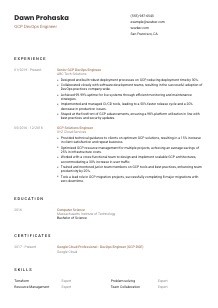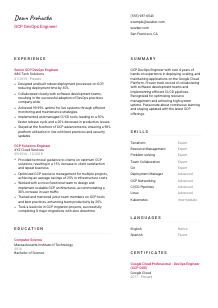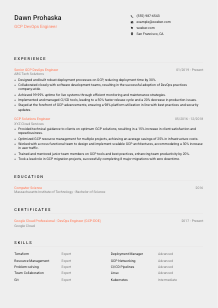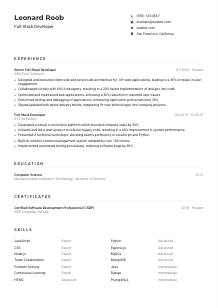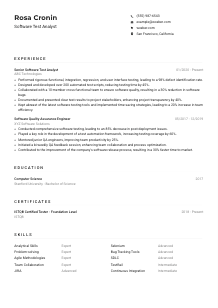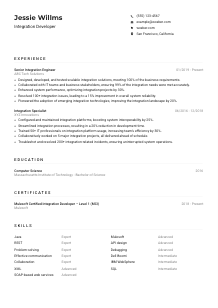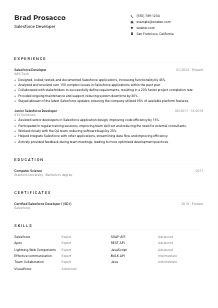GCP DevOps Engineer Resume Example
Juggling clouds, but your resume is feeling foggy? Check out this GCP DevOps Engineer resume example, shaped with Wozber free resume builder. Learn how to sync your Google Cloud Platform wizardry with job specs, setting your career trajectory as clear and scalable as a GCP architecture!
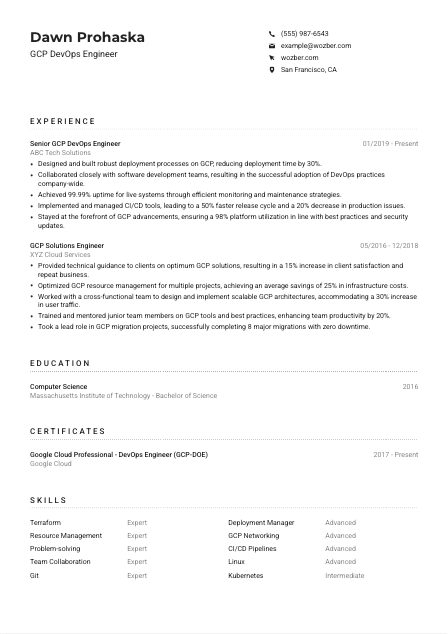
How to write a GCP DevOps Engineer resume?
As a budding GCP DevOps Engineer poised to conquer the cloud, your resume isn't just a document – it's the key that unlocks career opportunities on the vast horizon of Google Cloud Platform. Crafting a resume that stands tall like the robust architecture of GCP requires insight, precision, and a sprinkle of creativity. With the help of Wozber's free resume builder, this guide is meticulously designed to navigate you through tailoring a resume with precision, harmonizing with the pulse of the GCP DevOps Engineer role.
Let's embark on this quest to mold your professional narrative into an ATS-compliant masterpiece, setting your career trajectory soaring through the clouds.
Personal Details
First impressions count, and in the world of resumes, your personal details section is the digital handshake. Making this connection count means aligning it perfectly with the expectations of a GCP DevOps Engineer role. Dive in to understand the tweaks to transform this section into a beacon signaling your readiness.
1. Name: Brand Your Cloud Expertise
Your name is not just a label; it's the banner under which your whole cloud engineering prowess stands. Make it bold and clear, symbolizing your confidence. An ATS-compliant resume begins with clarity, ensuring your name is the first thing that catches an employer's eye.
2. Job Title: Reflect Your Aspiration
Including the exact job title "GCP DevOps Engineer" as seen in the job description immediately places you in the running. This alignment assures the ATS and the hiring managers that you're not just a wanderer, but a professional aiming directly for the GCP clouds.
3. Contact Information: The Bridge to Opportunities
Your phone number and professional email address are your lifeline in the job-hunting journey. Use a simple, ATS-friendly format, ensuring these essential details are error-free and easily accessible. With Wozber's ATS resume scanner, verify the visibility of your contact info to bypass ATS filters seamlessly.
4. Location: Cloud Engineering from the Right Coordinates
Being located in "San Francisco, CA" isn't just a detail; it's a strategic advantage for this role and compliance with the job listing. It reassures the employer of your immediate availability and local expertise, eliminating relocation concerns.
5. A Link to Your World: The Professional Profile
Adding a link to a LinkedIn profile or a personal website showcasing your cloud projects or certifications can give recruiters a deeper insight into your qualifications. Ensure these profiles are polished and echo your resume, leveraging every opportunity to display your expertise in the GCP landscape.
Takeaway
Your personal details are the doorway inviting hiring managers into your professional world. Craft this section with attention, ensuring it's aligned with the GCP DevOps Engineer role and ATS optimization. Let each detail contribute to building a strong first impression, paving the way for the rest of your resume to shine.





Experience
The experience section is where you get to show off your journey through the clouds. As a hopeful GCP DevOps Engineer, aligning your past roles with the specific requirements of your dream job is critical. Let's explore how to curate your experiences, making them resonate with the essence of GCP engineering.
- Designed and built robust deployment processes on GCP, reducing deployment time by 30%.
- Collaborated closely with software development teams, resulting in the successful adoption of DevOps practices company‑wide.
- Achieved 99.99% uptime for live systems through efficient monitoring and maintenance strategies.
- Implemented and managed CI/CD tools, leading to a 50% faster release cycle and a 20% decrease in production issues.
- Stayed at the forefront of GCP advancements, ensuring a 98% platform utilization in line with best practices and security updates.
- Provided technical guidance to clients on optimum GCP solutions, resulting in a 15% increase in client satisfaction and repeat business.
- Optimized GCP resource management for multiple projects, achieving an average savings of 25% in infrastructure costs.
- Worked with a cross‑functional team to design and implement scalable GCP architectures, accommodating a 30% increase in user traffic.
- Trained and mentored junior team members on GCP tools and best practices, enhancing team productivity by 20%.
- Took a lead role in GCP migration projects, successfully completing 8 major migrations with zero downtime.
1. Dissecting the Job Description
Start your journey by breaking down the job description. For instance, "Design, build, and support the deployment and scaling processes on Google Cloud Platform" isn't just a line; it's a map of experiences you need to showcase. Highlight these critical phrases as they will guide the narratives you choose to include.
2. Chronology and Clarity
Present your path in the cloud realm in reverse-chronological order, placing your most recent and relevant achievements front and center. This structure is not only ATS-friendly but also allows hiring managers to quickly gauge your growth and how recent your GCP expertise is.
3. Convey Impact with Accomplishments
"Implemented and managed CI/CD tools, leading to a 50% faster release cycle." Such statements demonstrate your impact and expertise, using metrics to quantify achievements. Tailor each accomplishment to reflect the job requirements, showcasing your direct contributions to GCP projects.
4. Quantification: Adding Substance to Your Claims
Whenever possible, quantify your achievements. Whether it's reducing deployment time, increasing system uptime, or lowering infrastructure costs, tangible metrics offer a concrete understanding of your capabilities and successes in the GCP domain.
5. Relevance: Clouds over Ping-Pong
Keep your focus sharp. While being the office ping-pong champion might show team spirit, your GCP migrations, and CI/CD pipeline optimizations are the headliners. Curate your experiences to mirror the job description, keeping the content relevant and engaging for a GCP DevOps Engineer role.
Takeaway
Your experience section is your professional narrative told through the lens of GCP. Use it to articulate not just where you've been, but how those journeys align with where you want to go. Craft each statement with precision, let your achievements shine brightly, and show the hiring world that you're ready to take on the GCP DevOps Engineer role head-on.
Education
In the realm of cloud computing, your educational background lays down the foundational knowledge necessary to navigate complex systems like GCP. Here's how to fine-tune this section to reinforce your candidacy for the GCP DevOps Engineer position.
1. Matching the Key Criteria
Bachelor's degree in Computer Science, Engineering, or a related technical field – this requirement straight from the job listing highlights the importance of showcasing your educational credentials that match. Ensure your degree is listed in a way that resonates with this stipulation.
2. A Clear, Concise Format
Structure this section for quick scanning, with your degree, field of study, institution, and graduation year readily visible. An ATS-friendly resume template from Wozber ensures this information is organized in a manner that both ATS and human eyes appreciate.
3. Tailoring for Tech
Given the specialized nature of the GCP DevOps Engineer role, highlight the aspects of your education that align with the job. If your coursework or projects directly pertain to cloud computing or DevOps, make a note of it here. This establishes the depth of your relevant educational background.
4. Academic and Extracurricular Highlights
For early-career professionals or those with unique distinctions, including relevant academic achievements or tech-focused extracurricular activities can be valuable. However, gauge the significance of these details based on the seniority level of the role you're applying for.
5. Continuous Learning
Especially in tech, education doesn't end with a degree. If you've taken additional courses relevant to GCP or DevOps, mentioning these can demonstrate your commitment to staying at the forefront of technological advancements. This ongoing curiosity is a trait highly valued in the cloud engineering field.
Takeaway
Your education section is more than just a list of degrees; it's a narrative of your journey into the world of GCP DevOps engineering. Tailor this section to reflect the educational backdrop the role demands, showcasing your foundational knowledge and your commitment to expanding upon it. Present it as another reason why you're the perfect fit for the job.
Certificates
In a field as competitive and rapidly evolving as GCP DevOps, certifications act as badges of honor, proving your skills and dedication. Here's how to select and present your certifications to cast a spotlight on your expertise for the GCP DevOps Engineer role.
1. Certifications: Showcasing Your Dedication
While our job description didn't explicitly require certifications, listing them, such as "Google Cloud Professional - DevOps Engineer (GCP-DOE)", explicitly enforces your specialized skills and commitment to the field. It's a clear signal to employers of your capability and foresight.
2. Selectivity and Relevance
In the sea of possible certifications, focus on those most relevant to the GCP DevOps Engineer position. This not only highlights your relevant expertise but also showcases your strategic approach to personal and professional development.
3. Timeliness and Transparency
Be honest about the status of your certifications, dutifully noting any that have specific expiry dates. This honesty reflects well on your professionalism and ensures that your resume remains ATS-compliant, with current and verifiable information.
4. A Commitment to Continuous Growth
The tech landscape continually shifts, especially within cloud platforms like GCP. Make it known that you're committed to staying updated and advancing your expertise by pursuing new certifications and learning opportunities. This attitude is a tremendous asset in the fast-paced world of DevOps.
Takeaway
Your certifications are powerful testimonials of your expertise, learning agility, and dedication to the GCP DevOps field. Curate them with precision to reflect your qualifications for the role and your commitment to staying abreast of technological trends and advancements. Let them serve as concrete evidence of your proficiency and passion.
Skills
The skills section of your resume is like your professional toolkit, always ready to demonstrate your capability in managing the GCP environment. Let's pinpoint how to refine this section to make it resonate with the specific demands and competencies required for a GCP DevOps Engineer role.
1. Decipher the Job Requirements
Identifying both the stated and implied skills in the job description is the first step. Skills like "Terraform" and "GCP Networking" aren't just buzzwords; they're your currencies in the cloud marketplace. Matching these with your skillset assures the ATS (and recruiters) of your compatibility.
2. Curate with Precision
While you might possess a vast array of skills, prioritize those most relevant to the role of a GCP DevOps Engineer. This ensures that your resume remains focused, and each skill you present adds weight to your candidacy. An ATS-friendly resume format helps highlight these skills efficiently.
3. Quality Over Quantity
This mantra holds true, especially here. Instead of listing every skill you've ever encountered, focus on those where you excel and that directly relate to the job description. Presenting a concentrated list of high-caliber skills makes a strong statement about your specialized expertise.
Takeaway
Each skill you list is a testament to your aptitude for the GCP DevOps Engineer role. Tailor this section with an eye for detail, ensuring it showcases your strongest competencies that align with job expectations. Remember, your skills are the armor in your professional arsenal; make them count.
Languages
In the interconnected realm of cloud engineering, where collaboration crosses borders, your ability to communicate in multiple languages can be a significant asset. Here's how to align this section with the GCP DevOps Engineer responsibilities and add another layer of appeal to your resume.
1. Prioritizing Job Needs
The job description emphasized English proficiency for effective communication. Ensure you list English at the top, clearly indicating your level of fluency. This direct alignment with the job requirement underscores your readiness to operate in the role's primary language.
2. Listing Additional Languages
If you're fluent in languages beyond what's required, don't hesitate to list them. This could be particularly advantageous for roles interacting with international teams or clients. While not explicitly needed for the GCP DevOps Engineer role, it showcases versatility and global awareness.
3. Clarity in Proficiency
Be honest and precise about your language proficiency levels. Using terms like "native," "fluent," "intermediate," and "basic" provides a clear picture of your linguistic capabilities, adding another dimension to your professional profile.
4. Understanding the Global Impact
For roles that hint at global engagement or multi-regional teams, the ability to communicate in more than one language amplifies your appeal. It suggests that you're not just a technical expert but also a versatile communicator, poised to thrive in diverse environments.
Takeaway
Your linguistic skills reflect your capacity to navigate the global stage of cloud engineering. While the primary focus for a GCP DevOps Engineer role may be technical expertise, never underestimate the power of communication. Showcase your languages as bridges to broader opportunities and collaborations.
Summary
The summary is your chance to ascend above the crowd, offering a bird's-eye view of your professional landscape. Here's how to distill your experiences, skills, and aspirations into a compelling introduction that aligns with the GCP DevOps Engineer role, drawing recruiters into your story.
1. Grasping the Job Essence
Absorb the core requirements and desired attributes of the GCP DevOps Engineer role. This understanding will be the bedrock of your summary, enabling you to craft a narrative that resonates with the specificities of the position, appealing directly to the recruiters' needs.
2. Starting Strong
Open with a statement that encapsulates your professional identity within the cloud engineering domain. Highlight your tenure and areas of specialization, setting a solid foundation for your summary. This direct approach showcases confidence and clarity in your professional trajectory.
3. Weaving in Your Expertise
Mention your defining skills and achievements, linking them to key responsibilities of the role. For example, if the job stresses CI/CD pipelines, reference your direct experience and outcomes in implementing these processes. This demonstrates not just fit, but excellence.
4. Keeping It Crisp
While it might be tempting to cover every detail of your career, the summary should be a teaser, not the full reveal. Aim for impact over quantity; a concise, potent introduction piques interest and invites the reader to explore the depth of your resume.
Takeaway
Your summary is the gateway to your professional story, highlighting your compatibility with the GCP DevOps Engineer role. Tailor it to speak directly to the job's requirements, crafting it as an invitation to uncover the full extent of your expertise. Let this section echo your readiness to soar in the role, setting the tone for the detailed narrative that follows.
Embarking on Your GCP DevOps Engineer Journey
Congratulations on completing this comprehensive guide to crafting a resume tailored for the GCP DevOps Engineer role. With Wozber's ATS-friendly resume template and ATS resume scanner, you're fully equipped to create a resume that not only meets but exceeds the expectations of hiring managers. Remember, your resume is more than a document; it's the narrative of your professional journey in cloud engineering. Use it to tell your story with confidence, precision, and a touch of creativity.
The cloud is vast, and with your newly polished resume, your possibilities are limitless. Go forth and make your mark as a GCP DevOps Engineer!

- Bachelor's degree in Computer Science, Engineering, or a related technical field.
- Minimum of 3 years of experience in GCP platform and services.
- Proficiency in infrastructure-as-code using tools like Terraform or Deployment Manager.
- Deep understanding of GCP networking, security, resource management, and CI/CD pipelines.
- Excellent problem-solving skills and ability to work in a team-oriented, collaborative environment.
- Must be capable of communicating effectively in English.
- Must be located in San Francisco, CA.
- Design, build, and support the deployment and scaling processes on Google Cloud Platform (GCP).
- Collaborate with software developers to facilitate the adoption of DevOps practices and tools.
- Monitor and maintain live systems, ensuring high uptime and performance.
- Implement and manage CI/CD tools, processes, and pipelines for continuous delivery and deployment.
- Stay updated with the latest GCP offerings, best practices, and security updates to ensure optimum platform usage.





